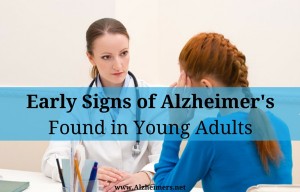 Share on Facebook
Share on Facebook
 While age is the number one risk factor for Alzheimer’s disease, Alzheimer’s is not a natural part of aging and the disease affects more than just the senior age group. In fact, a recent study has found evidence of amyloid buildup in the brains of people as young as 20 years old. Learn more about this study and what it means for the future of Alzheimer’s research. https://www.alzheimers.net/wp-content/uploads/2015/03/early-signs-of-alzheimers-found-in-young-adults.jpg 600w" sizes="(max-width: 300px) 100vw, 300px" width="300" height="192">
While age is the number one risk factor for Alzheimer’s disease, Alzheimer’s is not a natural part of aging and the disease affects more than just the senior age group. In fact, a recent study has found evidence of amyloid buildup in the brains of people as young as 20 years old. Learn more about this study and what it means for the future of Alzheimer’s research. https://www.alzheimers.net/wp-content/uploads/2015/03/early-signs-of-alzheimers-found-in-young-adults.jpg 600w" sizes="(max-width: 300px) 100vw, 300px" width="300" height="192">
Beta Amyloid Plaques Found in the Brains of Young Adults
A new study lead by Changiz Geula, a research professor at the Northwestern University Feinberg School of Medicine in Chicago, found evidence of Alzheimer’s disease in the brains of deceased adults as young as 20 years old. The research team analyzed the brains of 13 people between the ages of 20-66 with no health issues, 14 people without dementia between the ages of 70-99, and 21 brains of people with Alzheimer’s between the ages of 60-95. They observed that toxic amyloid buildup was evident irrelevant of age and health.
Amyloid buildup is a hallmark of Alzheimer’s, which is commonly found in the brains of seniors who have the disease. “Amyloid is bad,” said Geula. “We don’t know the exact mechanism by which it causes damage, or if amyloid buildup is the main trigger for Alzheimer’s, so we can’t say that it actually causes the disease. But for a long time we have known that it causes toxic damage, and it cannot be good for you when it accumulates.”
He went on to say that to find the accumulation of amyloid inside nerve cells of individuals as young as 20 was very surprising.
Earlier Prevention and Intervention
Researchers plan to look at a larger number of seniors to determine if the ones with higher amyloid build up have a higher risk for Alzheimer’s or dementia. Because of the smaller sample size of this study, it was hard to determine how much variability there is among the general population. Some seniors in the study were found to have the same amount of amyloid buildup that was also seen in the brains of younger adults.
Dr. Yvette Sheline, professor of psychiatry, radiology and neurology at the University of Pennsylvania Perelman School of Medicine, noted that while it was interesting to see amyloid accumulation at an early age, the findings were based on a small handful of brain samples and that it was impossible to know if the younger adults would ultimately develop Alzheimer’s, or if beta-amyloid accumulation is a normal part of human physiology.
Taking into consideration the small sample size, other researchers believe the new findings may be instrumental in providing insight into the beginning of Alzheimer’s. Geula is hopeful that the findings of his team will lead to early intervention and a new way to treat the disease. He said:
“The implication appears to be that if we want to prevent these clumps from forming when a person becomes old, we may need to intervene much earlier than we have thought, to try and get rid of amyloid very early in life.”
https://www.alzheimers.net/3-16-15-alzheimers-signs-found-in-young-adults/


